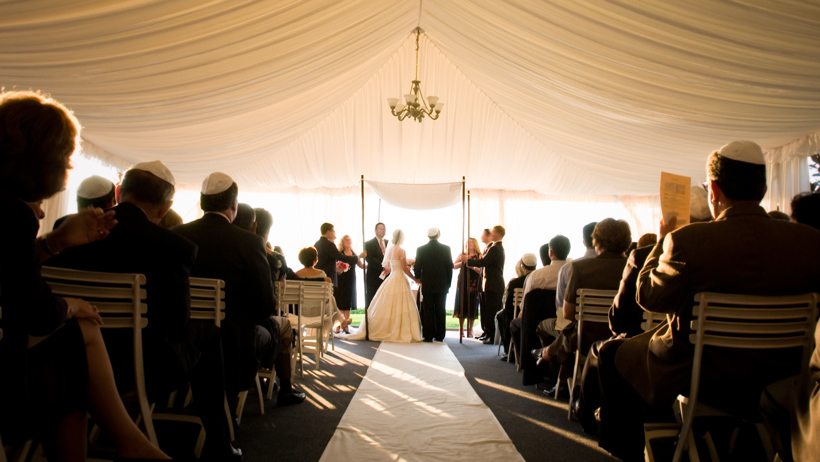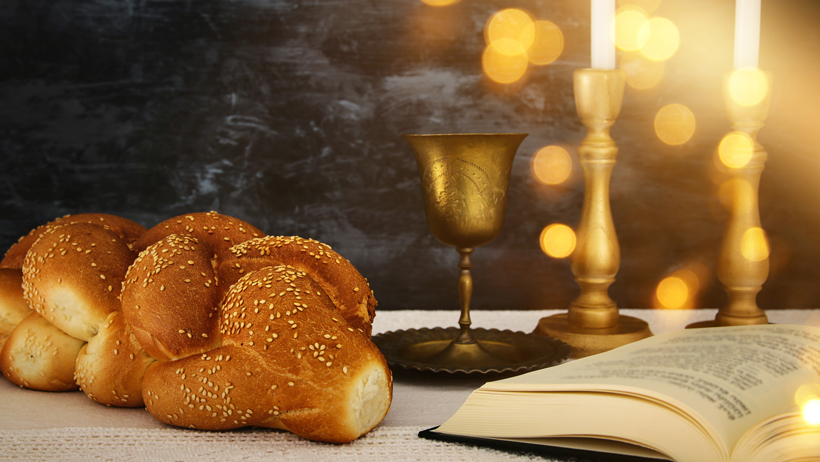The party goes on. In my last post, I wrote about Jewish parties related to Shabbat and the Torah. In this installment, I discuss Jewish parties that are held around special occasions such as a wedding or birth.
Aufruf
Of course, a wedding is a big deal. But even the Shabbat prior, a small celebration called an aufruf, (pronounced OOF-roof or UFF-ruff) is held during services. The couple is called to the Torah (aufruf means "calling up"), then showered by the congregation with candy, which is then eagerly scooped up by the kids in attendance. In Temple days, we used nuts, but today, the much softer Fruit Gems are preferred. A hora circle is formed, then the couple may also receive a blessing from the rabbi and a gift from the congregation.
Shabbat Kallah
This is sort of a Jewish bridal shower, in that attendance is only expected of women. It is held on the Shabbat afternoon that falls before the wedding. Instead of physical presents, the guests offer gifts of wisdom, insight and humor as to what the new bride should expect in this new chapter in her life.
Kabbalat Panim / Tisch
Just before the wedding ceremony itself, two celebrations are held. The bride holds queenly court at a Kabbalat Panim ("accepting of faces") and is not allowed to leave her "throne" as her bridesmaids usher the guests toward her and fetch her needs. The men, meanwhile, are having a tisch, (literally "table"), in another room. He tries to deliver a sermon, but is interrupted by outbursts of song (and shots of booze). At some ceremonies, a "tana'im" is signed between the two fathers, and a plate is broken by the two mothers, both signifying the permanence of the new inter-family bond. Then the groom is escorted joyously to his bride -- where he sees that it is, in fact, her (so as to not be fooled like Jacob) -- and veils her himself.
Sheva Brachot
Sheva brachot ("Seven blessings") are said under the chuppah (wedding canopy), but this was taken as a sign (or excuse) to hosts seven after-parties for the couple -- each at a different home -- over the course of the week following the wedding. This gives those who could not attend a chance to celebrate the newlyweds. In fact, one "new face" should be invited to each of the seven events.
Brit Bat / Simchat Bat
While parents of Jewish girl-babies may be relieved that their newborn does not require a brit milah, or ritual circumcision, many still felt that their daughters should not be denied a festive gathering. So this female naming ceremony, was introduced and caught on. Over the years and around the world, various girl-naming ceremonies have developed.
Pidyon HaBen
Originally, the firstborn sons of each tribe were intended to serve in the Holy Temple. But then the whole Golden Calf mess happened, the firstborns participated, so they were fired and the Levite tribe took the job. But still, the firstborns had to be redeemed from Temple service. This is done by the father of the firstborn giving five silver coins -- these days, we use silver dollars -- to a kohein (one descended from a priest), who thus absolves the newborn firstborn of his Temple duties. The ceremony, held in the home a month after the birth, is often used as an occasion for a festive meal.
Shalom Zachor / Zeved HaBat
A Jewish baby's first Shabbat is a milestone. But it's often difficult for the parents of a newborn to prepare an elaborate Friday night meal (or even a PB&J). So the extended family pitches in. "Shalom zachor" means "Welcome, boy!" Again, it was pointed out that this excludes half the population, and an equivalent ceremony for girls was developed, based on Sephardi practices.
Upsherin
Some Jewish boys don't get their first haircut until their third birthday. Linked to the idea of not picking fruit from a tree until its third year, the practice of letting boys' hair grow has been explained in many ways. As a parent, I think it's largely because little kids are often scared of getting their hair cut. They scream and squirm, and with sharp scissors near their faces at that. Better to just wait and use more shampoo until they can sit calmly. Yes, some girls decide they want an upsherin, too. And why not? If I no longer have to sit for a half-hour every evening with a comb and a screaming kid while breathing de-tangler spray, that's a great excuse for a party.
Are there other non-holiday Jewish parties you would like to see discussed? Let me know in the comments.


.jpg?n=4350)

.jpg)





.jpg)



